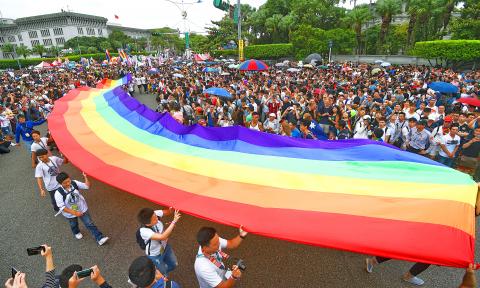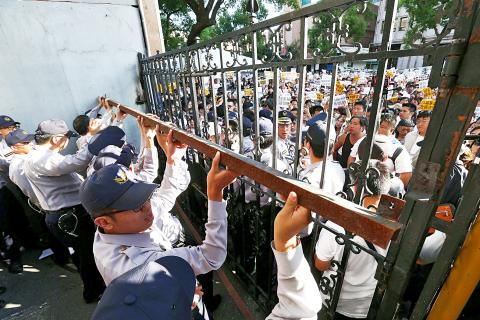When the rain began to fall on their parade, countless rainbow umbrellas went up as 82,000 lesbian, gay, bisexual, and transgender (LGBT) people and supporters marched in the 14th Taiwan LGBT Pride parade (台灣同志遊行) in Taipei on Oct. 29, once again setting a new record for one of Asia’s largest LGBT events.
In response to their call, the Democratic Progressive Party (DPP), Chinese Nationalist Party (KMT) and New Power Party (NPP) all proposed draft amendments to the Civil Code (民法) to legalize same-sex marriage.
On Nov. 8, many cheered as the draft bills proposed by DPP Legislator Yu Mei-nu (尤美女) and KMT Legislator Jason Hsu (許毓仁) passed their first reading at the Legislative Yuan. They were then sent to the legislature’s Judiciary and Organic Laws and Statutes Committee for a review, and will become law if they can clear the second and third readings.

Photo: Fang Pin-chao, Taipei Times
The proposals aim to revise, among other things, wording that specifies marriage as an agreement made by “male and female parties,” proposing to instead say “two parties.”
DELAY OF REVIEW
As Taiwan is one step closer to marriage equality, anti-LGBT religious groups are making every effort to block the legislation. On the day of the committee’s review, the Happiness of the Next Generation Alliance (下一代幸福聯盟) organized another anti-LGBT protest to surround the Legislative Yuan.

Photo: CNA
“Save the family!” read the placards held by the protesters, who shouted slogans such as “homosexuality is contagious,” “each gay has 1,000 sex partners” and “legalizing same-sex marriage is [no different than] legalizing orgies.” The situation became even more chaotic when dozens of protesters broke into the Legislative Yuan to interrupt the review, demanding that more public hearings be held.
Despite the organizer’s attempt to portray the rally as a non-religious affair, the active mobilization of the Alliance of Taiwan Religious Groups for the Protection of the Family (護家盟) and a handful of Christian groups made it abundantly clear that religious groups were behind the event.
The organizer claimed that many young people joined the protest voluntarily. The Student Union for Marriage Equality (同學陣), however, revealed that Fu Jen Catholic University student Shih Chun-yu (施俊宇) wrote in an ad on his Facebook page that attending the protest was a “great part-time job opportunity” for students, because they could receive hourly subsidies higher than the government’s minimum hourly pay.
Shih was responsible for mobilizing young participants for the rally. He serves as the chair of the university’s Faith, Hope and Love Club (信望愛社). Although he quickly removed the post, whether those young people joined the protest voluntarily is doubtful, and the source of the so-called subsidies is suspicious.
SCUFFLES BREAK OUT
On the day of the protest, scuffles broke out inside the legislature when KMT lawmakers, led by notorious anti-gay caucus whip Liao Kuo-tung (廖國棟), tried to block the committee’s review.
The KMT demanded that the legislature freeze the review until it has held 30 public hearings across Taiwan, although the Legislative Yuan and Ministry of Justice have already held dozens of public hearings.
Due to the KMT’s boycott, Yu, a convener of the committee, was forced to compromise by aborting the review and holding two public hearings by the end of this year.
“They are calling for more public hearings just to delay the review... The LGBT people have been waiting for years, and how many more years do they have to wait?” Yu said at the committee after the review was delayed.
As expected, the first of the two public hearings held on Thursday was chaotic and fueled by hate speech and groundless accusations from discriminatory representatives recommended by the KMT.
“Men’s sexual organs are created for women, and vice versa. The world will perish if we think our sexual organs belong to us,” said Hsu Hui-chen (許惠珍), a section chief of the Family Federation for World Peace and Unification (世界和平統一家庭聯合會), at the public hearing.
A FAIR REVIEW
Meanwhile, some Christian groups are using fear to stir up their followers, who call their legislators en masse, effectively blocking their phones and paralyzing their offices, pressuring them to withdraw their signatures from the draft bills.
They even spent millions of New Taiwan Dollars to run advertisements on the front pages of Taiwan’s four major newspapers, trying to mislead the public by distorting the content of the draft bills, claiming that this would collapse family structure and encourage children to have sex. But the costly front-page hate ads actually exposed the massive “religion-and-money” collusion behind them.
The Taiwan International Association for Gay Rights (台灣國際同志權益促進會) held a press conferences on Wednesday, saying that the Bread of Life Christian Church (靈糧堂) and Truth Lutheran Church (真理堂) may have violated the Charity Donations Destined for Social Welfare Funds Implementation Regulations (公益勸募條例) for running those newspaper ads, because running such ads for a political purpose is not a “religious activity” defined by the law.
“The purpose of the public hearings is to communicate with each other,” Yu said in response to the opposition of those Christian groups. “It is hoped that all sides can put aside their biases and squarely face the LGBT issue with utmost sincerity,” she added.
Yu is quite right. Taiwan has debated the issue for about 30 years, and it’s time for some constructive dialogue. Let’s have a full and fair review of the bills, so we can handle this rationally and in a timely manner.

That US assistance was a model for Taiwan’s spectacular development success was early recognized by policymakers and analysts. In a report to the US Congress for the fiscal year 1962, former President John F. Kennedy noted Taiwan’s “rapid economic growth,” was “producing a substantial net gain in living.” Kennedy had a stake in Taiwan’s achievements and the US’ official development assistance (ODA) in general: In September 1961, his entreaty to make the 1960s a “decade of development,” and an accompanying proposal for dedicated legislation to this end, had been formalized by congressional passage of the Foreign Assistance Act. Two

Despite the intense sunshine, we were hardly breaking a sweat as we cruised along the flat, dedicated bike lane, well protected from the heat by a canopy of trees. The electric assist on the bikes likely made a difference, too. Far removed from the bustle and noise of the Taichung traffic, we admired the serene rural scenery, making our way over rivers, alongside rice paddies and through pear orchards. Our route for the day covered two bike paths that connect in Fengyuan District (豐原) and are best done together. The Hou-Feng Bike Path (后豐鐵馬道) runs southward from Houli District (后里) while the

On March 13 President William Lai (賴清德) gave a national security speech noting the 20th year since the passing of China’s Anti-Secession Law (反分裂國家法) in March 2005 that laid the legal groundwork for an invasion of Taiwan. That law, and other subsequent ones, are merely political theater created by the Chinese Communist Party (CCP) to have something to point to so they can claim “we have to do it, it is the law.” The president’s speech was somber and said: “By its actions, China already satisfies the definition of a ‘foreign hostile force’ as provided in the Anti-Infiltration Act, which unlike

Mirror mirror on the wall, what’s the fairest Disney live-action remake of them all? Wait, mirror. Hold on a second. Maybe choosing from the likes of Alice in Wonderland (2010), Mulan (2020) and The Lion King (2019) isn’t such a good idea. Mirror, on second thought, what’s on Netflix? Even the most devoted fans would have to acknowledge that these have not been the most illustrious illustrations of Disney magic. At their best (Pete’s Dragon? Cinderella?) they breathe life into old classics that could use a little updating. At their worst, well, blue Will Smith. Given the rapacious rate of remakes in modern